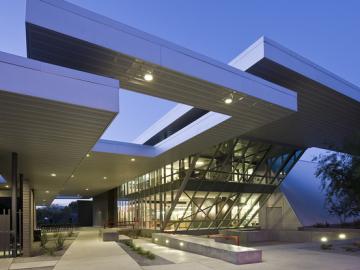
The Poetry Coalition, of which the University of Arizona Poetry Center is a founding member, will benefit from a $200,000 grant from the Ford Foundation.
The Academy of American Poets will administer the two-year grant, which will enable the new network of poetry organizations to create national programs promoting poetry. Additionally, the Poetry Coalition will hold its next annual meeting in Tucson, at the UA's Helen S. Schaefer Building.
"The University of Arizona Poetry Center is thrilled to be a part of this historic alliance of peer organizations," said executive director Tyler Meier. "Through our collective efforts, the Poetry Coalition is helping create new awareness about the role poetry and poets play in our culture, making more visible the way poetry can help us relate — through empathy, recognition and imagination — to the complex social challenges that vex our moment.”
The Poetry Coalition, launched last November after a year of planning, is an alliance of more than 20 nonprofit poetry organizations in 11 cities, working together to raise the profile of poets and poetry in the United States, promote the value poets bring to our culture and communities, and highlight the contributions poetry makes in the lives of people of all ages and backgrounds.
"Having support from the Ford Foundation is an important validation of the vital role poetry plays in our culture and communities," said Jennifer Benka, executive director of the Academy of American Poets. "It is through poetry that we learn about one another on a fundamental human level. This support is also a key endorsement of poetry organizations working together in a new, collaborative way."
The Poetry Coalition's programming will focus on themes of social importance, featuring leading contemporary poets, while building stronger connections and collaboration across its member organizations.
The coalition's annual meeting in Tucson will allow member organizations to shape themes and programming.
"Hosting the Poetry Coalition in Tucson at the University of Arizona is a dream, and I can't wait to help connect our national peers to the work we are doing in Tucson and the Southwest," Meier said. "I think we are already seeing returns on coalition members working together and listening to each other and learning about each other's programs, challenges and opportunities. I know the Poetry Center has benefited enormously. I'm thrilled that in addition to funding a national program, this grant will provide a basis for this network of organizations to thrive both now and into the future."
Over the past few years, Poetry Coalition member organizations have witnessed increases in the number of students participating in poetry recitation and spoken-word events, in visitors to poetry websites, in individuals attending poetry readings and in young poets taking to social media to share their work.
"Reading and writing poetry builds foundational skills with our ability to pay attention," Meier said. "It's an art form that thrives on connecting us to the world around us and to ourselves.
"We live in a moment that requires complex and imaginative attention. By collaborating on programs, we will spotlight the art form's unique ability to create opportunities to engage in meaningful conversation, discover unexpected connections with each other, test our beliefs and our values, and inspire new readers. These organizations share a deep belief that poetry has a positive role to play in our country.”
The first of the Poetry Coalition's public offerings took place during March, with members presenting multiple programs based on the theme "Because We Come From Everything: Poetry & Migration," which borrows a line from U.S. poet laureate Juan Felipe Herrera's poem "Borderbus."
The UA Poetry Center, part of the College of Humanities, presented Herrera in a series of Tucson events. Programs included a visit to Davis Elementary School, a featured reading by Herrera at the Tucson Festival of Books, and a discussion between Herrera and Alberto Ríos, Arizona poet laureate and Academy of American Poets chancellor.

